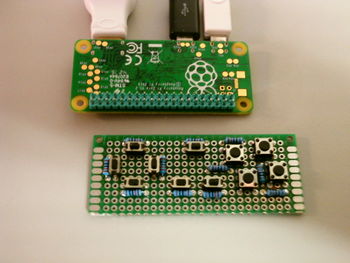The worlds smallest (S)NES emulator: Difference between revisions
No edit summary |
No edit summary |
||
| Line 1: | Line 1: | ||
{{Project | {{Project | ||
|Name=(S)NES emulator | |Name=(S)NES emulator | ||
|Picture= | |Picture=PTDC0004.JPG | ||
|Omschrijving=A very tiny, (probably the smallest ever) but functional NES and SNES emulator based on a Raspberry PI Zero | |Omschrijving=A very tiny, (probably the smallest ever) but functional NES and SNES emulator based on a Raspberry PI Zero | ||
|Status=Initializing | |Status=Initializing | ||
Revision as of 23:35, 23 November 2016
| Project (S)NES emulator | |
|---|---|

| |
| A very tiny, (probably the smallest ever) but functional NES and SNES emulator based on a Raspberry PI Zero | |
| Status | Initializing |
| Contact | Mahjongg |
| Last Update | 2016-11-23 |
I tried to buy the recently released NES Classic Mini system on its launch day (the 11th of November 2016), but failed because Nintendo distributed just a very few systems worldwide, creating an immediate shortage. I studied what the NES Classic Mini was based on, and discovered it was an emulator, based on an ARM system (quadcore all winner SoC). It could take many weeks before I will be able to buy one, but I knew that for Raspberry PI's there exists an emulation system called retroPI that is able to do the same thing.
I had a raspberry PI zero, and thought it would be nice to install retroPI on it, I also knew that it would be possible to control retroPI with buttons connected to the PI's GPIO's, and a piece of code from Adafruit that converts the buttons to a "Virtual USB keyboard". Looking at my zero I envisioned that it had a shape (but not size) resembling a NES controller, and had also seen YouTube movies that described a PI zero being built into a NES controller. I decided to see if I could place buttons on a piece of perfboard that had the same size as a Raspberry PI zero, and so this project was invented.